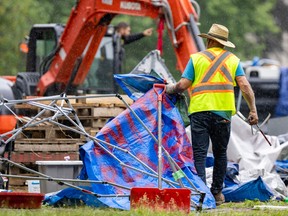Some 70 per cent of respondents said officials were right to have police and private security dismantle encampment at McGill University and Victoria Square
Article content
Most Canadians support police taking down illegal, disruptive anti-Israel encampments, according to a new national poll.
Conducted by Leger for the Association for Canadian Studies, the poll found some 70 per cent of Canadians surveyed agreed officials were right to have police and private security dismantle two encampments in Montreal, one at McGill University, the other in downtown Victoria Square.
Advertisement 2
Article content
Police in riot gear moved in before dawn on the morning of July 5 to dismantle the Victoria Square camp, two days after Quebec’s public security minister publicly accused the city of being too passive with anti-Israel protesters.
Five days after Victoria Square was cleared, police and agents from a private security firm used excavators and front-end loaders to take down roughly 100 tents and tarps at the McGill encampment, ending more than two months of legal battles, counter protests, accusations of antisemitism and rising concerns over security risks. The Quebec courts had twice refused to issue an injunction against the encampments. At one point, flyers promoting a “revolutionary summer program” were published online featuring photos of keffiyeh-clad Palestinian fighters brandishing machine guns.
The Victoria Square camp in downtown Montreal was organized by members of the Divest for Palestine Collective, in a bid to pressure Quebec’s pension fund manager to cut ties with Israeli institutions it accused of being complicit in the war between Israel and Hamas.
Article content
Advertisement 3
Article content
The anti-Israel encampment that began at McGill University in late April was the first campus encampment to sprout up in Canada, spurred by similar protest efforts in the United States. McGill was quickly followed by more than a dozen other universities, including the University of British Columbia, the University of Toronto and the University of Alberta.
Recommended from Editorial
The protesters demanded universities cut ties with Israel, end all arrangements with Israeli universities and divest from companies supplying arms to Israel or profiting from the deadly war with Hamas.
But the protesters had the support of just 19 per cent of Canadians, earlier Leger polling found.
Jack Jedwab, president of the Association for Canadian Studies, said McGill and Victoria Place serve as valid proxies for public opinion on other anti-Israel encampments. Overall, the poll found a majority of Canadians — 69 per cent — agreed with their removal.
Advertisement 4
Article content
Among students who expressed an opinion on the matter, twice as many favoured removal of the encampments: 40 per cent agreed police were correct to take down the encampments, versus 18 per cent who disagreed. A “considerable” 42 per cent of students in the survey said they didn’t know or preferred not to answer, Jedwab said in an email, “potentially suggesting a high degree of stigma associated with taking a position on either side of this.”
But the degree of opposition to the encampments, with just 13 per cent of Canadians of all ages polled disapproving of their removal, suggests the protesters were increasingly perceived as being disruptive, not only to student life but to the broader community, Jedwab said. “For many, they had already made their point, and/or they were not going to achieve their objective, however it was understood — which was also unclear to many Canadians.”
The protesters’ goals and objectives “are being seen as increasingly unclear,” he said.
McGill’s president and vice chancellor, Deep Saini, called the encampment a “heavily fortified focal point for intimidation and violence,” organized largely by outsiders who used tactics designed to “threaten, coerce and scare people.”
Advertisement 5
Article content
In the new poll, support for removal of the encampments was strongest among Canadians aged 55 and older, with 62 per cent reporting they “strongly agree” officials were correct to have police and private security take down the tents at McGill.
“For one thing, the appeal, and the accompanying message, however understood, was not directed” at older Canadians, Jedwab said. “For many, the underlying issue was a matter of trust, and the 55-plus group trusts the university leaders to a much greater extent than they did the encampment organizers.”
However, nearly half (48 per cent) of 18- to 34-year-olds also strongly or somewhat agreed with the removal of the encampments at McGill, while 24 per cent somewhat or strongly disagreed. Twenty-seven per cent of that age group said they didn’t know or preferred not to answer.
British Columbians and Quebecers (75 per cent) were most likely to endorse removal of the encampments at McGill and Victoria Square.
Leger surveyed 1,784 respondents via a web panel between July 12 and 15. A margin of error can’t be associated with a non-probability sample in a panel survey. A probability sample of 1,784 respondents would have a margin of error of plus or minus 2.5 per cent, 19 times out of 20.
National Post with additional reporting from the Montreal Gazette.
Our website is the place for the latest breaking news, exclusive scoops, longreads and provocative commentary. Please bookmark nationalpost.com and sign up for our daily newsletter, Posted, here.
Article content









